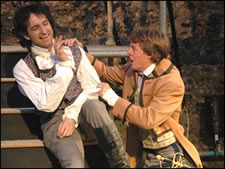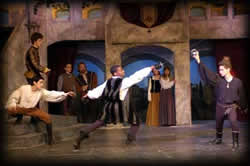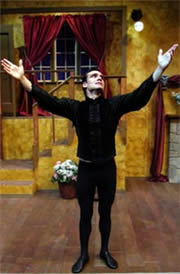Lesson 5.2C: Act III
In any Shakespearean play, Act III is the climax and Romeo and Juliet is no exception. Up to this point, things have been relatively smooth for the young lovers; but an event will happen in this act that will pose an obstacle too significant for Romeo and Juliet to overcome.
Act III
 Watch Act III of Romeo and Juliet (scenes 9 - 14 on the DVD “Scene Selection” menu). Watch Act III of Romeo and Juliet (scenes 9 - 14 on the DVD “Scene Selection” menu).
 Here's a quick summary of Act III: Here's a quick summary of Act III:
- It is hot, hot, hot, and Benvolio and Mercutio are trying to escape the heat.
- Benvolio and Mercutio (both Montagues) meet Tybalt (a Capulet).
- Tybalt is looking for Romeo, and when he shows up, Tybalt attempts to provoke him into fighting. Tybalt has already issued a challenge to Romeo.
- Mercutio fights Tybalt instead and is killed as Romeo tries to intervene.
- Romeo then kills Tybalt.
- Escalus, the Prince of Verona, banishes Romeo from Verona, threatening death should he ever return.
- Juliet learns of Romeo killing Tybalt, and despite being torn between her loyalty for her family and Romeo, mourns her husband Romeo's banishment.
- Romeo learns of his banishment, realizing he will not be able to see Juliet again.
- Friar Laurence suggests Romeo go to Juliet's bedchamber to comfort his wife.
- Capulet, who does not know of Romeo and Juliet's secret marriage, decides that the marriage of Juliet to Paris must now proceed, bidding his wife to make Juliet aware of Paris' love for her.
- The day of the marriage has been decided - it will be Thursday.
- We learn that Romeo has spent the night with his Juliet.
- Juliet, who is already secretly married to Romeo, learns that now she is to marry Paris.
- She tries to fight her father's wishes, failing to dissuade him. Juliet decides to commit suicide if all else fails.
Tragedy Strikes
In Shakespeare's plays, the climax or the moment of highest intensity typically occurs in Act III, often in the first scene. The rest of the play involves the denouement or falling action which is the unwinding of the action based on the climax. This makes the next scene you are to read pivotal in Romeo and Juliet. Shakespeare has been preparing us for this scene since the very beginning. An important idea will be front and centre in this scene - fate.

You have just looked at examples of foreshadowing at the end of Act II. There are certainly other examples of foreshadowing that have occurred earlier in the play, like in the prologue.
You may remember the phrase “star-cross'd lovers” being used. This phrase is an example of fate. Elizabethans were believers in astrology, or the idea that they could read their fate in the stars. This helps to explain why Romeo and Juliet are called “star-cross'd.” An important thing to understand about fate is that it cannot be altered, and though you might choose to tempt or change your fate, you cannot.
Death overshadows love in this climactic scene. This is all part of tragedy, which is something you'll look at more closely in the next section.
 Read Act III.i. This is an incredibly important scene in the play, so read all of it very carefully. Read Act III.i. This is an incredibly important scene in the play, so read all of it very carefully.
|

Journal Entry 5.2B: Stars, I Defy You!
As you read through Act III.i, notice the many references to fate by the various characters. In the journal section of the assignment template, keep track of each of the references you find. Copy out the line and explain how each is an example of fate.
|
Example
| Line |
Explanation |
III.i.118 - 119
This day's black fate on more days doth depend; this but begins the woes others must end.
|
The “black fate” reference here shows that Romeo believes that Mercutio's wound is a result of an evil fate and is the beginning of more dark days to come. |
When you finish reading this scene, complete your Journal entry by writing about your reaction to what has happened in this scene. It is a whirlwind, a tour-de-force of action and surprise.
| Discussion Prompt |
Discuss the references to fate made in Act III. |
Guidelines for contribution:
List three references to fate mentioned in Act III. Copy the line(s) and explain how each is an example of or a reference to fate. Respond to the post of one other student and explain if you have a different understanding of fate presented in Act III.
Click here to add your thoughts to the forum. |
 Grief Compounded Grief Compounded
The remaining four scenes in Act III deal with the characters reacting to everything that happened in scene i, not so much the death of Mercutio, but rather the death of Tybalt.
The unwinding of the plot or denouement begins with Juliet. She is alone and speaks of her desire to be with Romeo. She has a lengthy speech to begin this scene. As you read through this speech, you begin to realize that you as reader or audience know what Juliet clearly does not. This is called dramatic irony. You know that Mercutio and Tybalt are dead, that the Prince has decreed Romeo is banished, and that Lady Capulet is grieving the loss of her nephew. Juliet knows none of this, which makes her words all the more powerful.

Now read Act III.ii.1-35 |

Journal Entry 5.2C: Juliet's Feelings
In the journal section of the assignment template, summarize what Juliet wants to happen in this lengthy speech. Think about what has last happened to her and not the other characters. Note about how she reveals her feelings in this speech. Just as you looked at light and dark motifs in the previous section assignment, focus now on how Juliet again uses light motifs in her speech.
|
 Shakespeare and the Soliloquy Shakespeare and the Soliloquy
You've just read Juliet's speech. This is the longest single speech in the play so far. Turn back to the beginning of Juliet's speech. Is there anyone else on stage with her or is she alone? (No, she's alone.) Does Juliet need to pretend or hide the fact she's married to Romeo? (No, she's alone.) Can Juliet be honest about how she's feeling without worrying about what another character will think? (Yes, she's alone.) This is called a soliloquy. Shakespeare uses soliloquies to reveal a character's thoughts while alone on stage. Think of it like a solo.
Here's another way of thinking about a soliloquy: In many of Shakespeare's plays, his characters are often not what they seem. The thoughts and feelings they express in conversation with other characters may be different from their true ones. When they address the audience, however, Shakespeare's characters often reveal their private, inner thoughts through asides and soliloquies. In short, a soliloquy is an extended monologue delivered by a character who is alone on the stage. Shakespeare accomplishes similar things by giving characters short asides as well.
 Take a moment now to listen to an audio recording of Juliet’s Soliloquy. Take a moment now to listen to an audio recording of Juliet’s Soliloquy.
Listen to the soliloquy a number of times. The first time through, simply try to get the gist of Juliet's words. Listen again to how Shakespeare builds powerful emotion and vivid imagery into this speech. View the images presented along with the soliloquy to help anchor some of the difficult language. Finally, listen to how the iambic pentameter and blank verse add to its dramatic effect. This is beautiful stuff, and also heart wrenching when you think about how Juliet is about to find out what Romeo has done.
Parting is Such Sweet Sorrow
The emotional rollercoaster continues as Act III draws to an end. Juliet feels betrayed by the Nurse, we find out that Paris is to marry Juliet in a few days. This, of course, after Romeo must flee Verona for Mantua. It's no wonder that Juliet feels alone and the world is crashing in on her.
As you read through the final reading passages for this section, focus on the emotions that Juliet is feeling. These emotions will be in stark contrast to the soliloquy you've just read.

Read Act III.iii.108 - 158, Act III.iv
|

Journal Entry 5.2C: Describing Juliet
In the journal section of the assignment template, list five adjectives or short phrases that describe how Juliet is feeling at various points in Act III of the play. Beside each of these words, provide a quote that emphasizes each adjective or phrase. You may present this as a two-columned chart. Here's an example for you to follow:
| Word or phrase describing Juliet |
Supporting quote |
| Juliet is desperate to be with Romeo |
"O, I have bought the mansion of a love / But not possessed it, and, though I am sold, / Not yet enjoy'd" (Act III.ii.26-28) |
|
Understanding Capulet
While Capulet's reaction to Juliet saying she won't marry Paris in Act III.v seems cruel and harsh, especially since he basically called her the apple of his eye back in Act I, it is important to note that in Elizabethan time, Capulet would have been well within his legal rights to throw his disobedient daughter out of his house, abandoning her to fend for herself or starve to death.

Read Act III.v.1-64; 105 - 242
|
Summary
Completing this lesson has helped you to:
- understand the different dramatic devices Shakespeare uses in Romeo and Juliet
- see how Shakespeare skillfully builds different emotions/moods through his characters and the situations they encounter
- understand Act III of Romeo and Juliet
|

